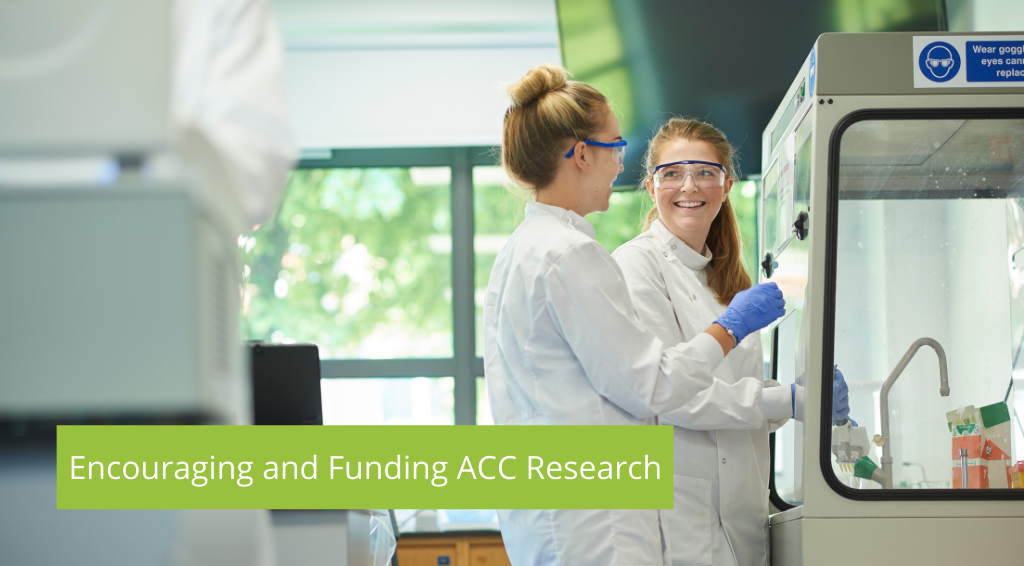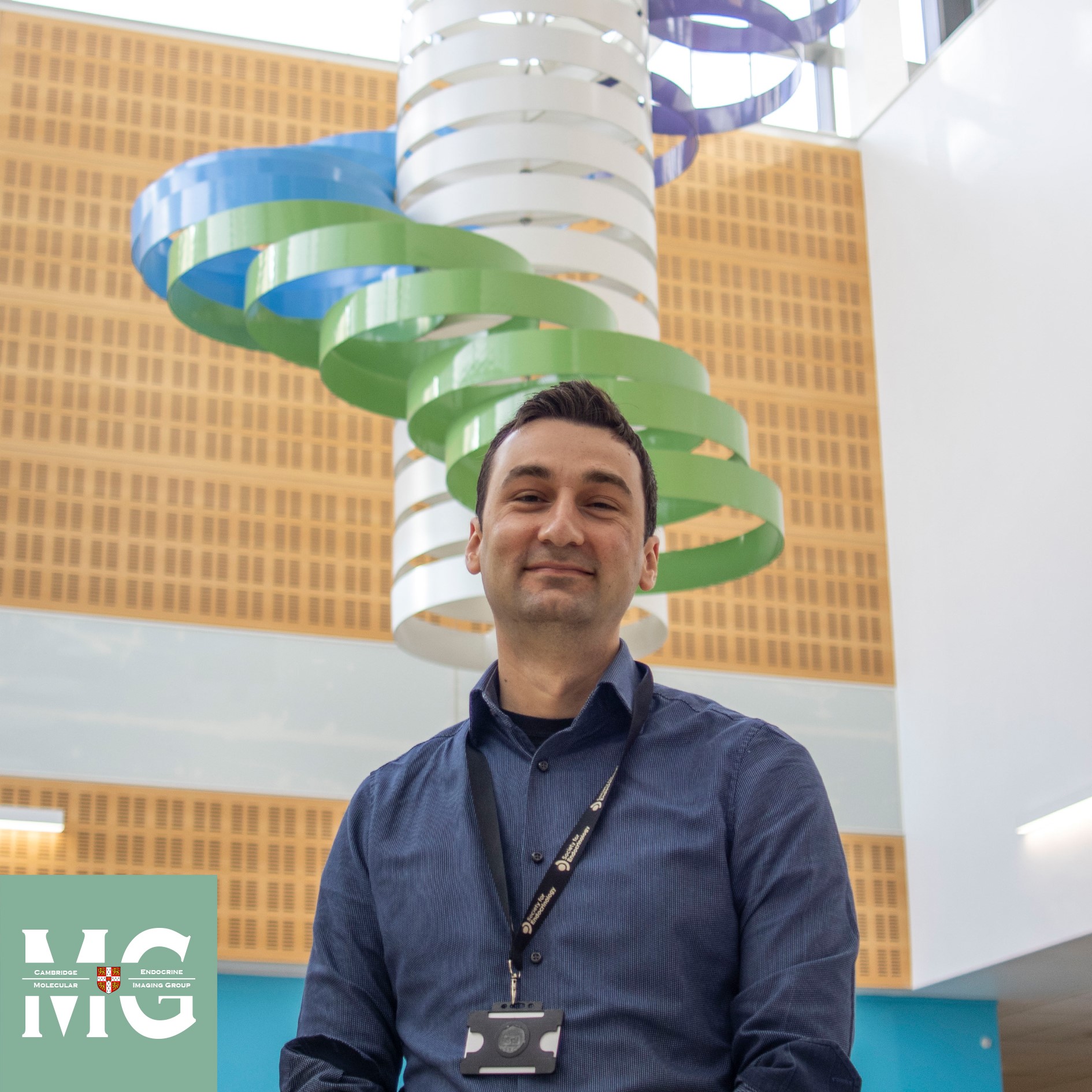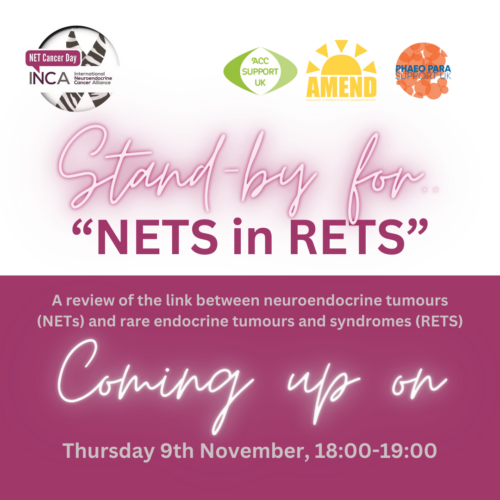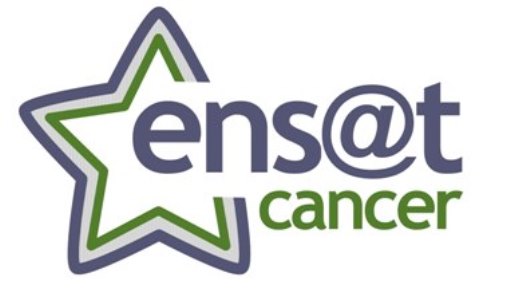Research Awards for projects aimed at ACC are administered by AMEND. AMEND wishes to support research and is provides grants (when surplus funds allow) to enable medical researchers to supplement an existing project or pump-prime new research ideas. Applicants must be registered members of AMEND and the successful projects must be specifically directed to the study of endocrine tumours, within the context of the Charity’s remit (MEN1, MEN2, MEN3, SDHx, ACC, spMTC). Awards are only available to projects carried out within the United Kingdom and Eire. Each project grant is usually worth up to £10,000, although larger and smaller amounts have been awarded. Commonly, up to 3 project grants are available annually, although this can vary according to surplus funds available.
2024 Research Award Round Closed
2022-2024 Specific Award Available for ACC:
- The Elliot Dallen Award for ACC Research formed part of the annual grants programme from 2022 to 2024 inclusive. The Elliot Dallen Trust was set up by the family and friends of the late Elliot Dallen, who had ACC. The Elliot Dallen Trust granted AMEND a fund of £10,000 per year for 3 years specifically for research into adrenocortical cancer.
For more information about our Research Awards, visit the AMEND website
Annabel Dallen (sister to Elliot) presenting the 2022 cheque to AMEND CEO, Jo Grey, for the 2022 Elliot Dallen Award for ACC Research.
2024 Research Award Recipient
Dr Cristina Ronchi (Birmingham): Circulating cell-free DNA-based biomarkers for longitudinal monitoring of patients with adrenocortical carcinoma (£10,000)
Project Lay Summary:
Close disease surveillance is crucial for patients with ACC. Currently, disease surveillance relies on frequent radiological imaging that is expensive, associated with increased exposure to radiation and cannot always answer diagnostic questions. In my research, I aim to improve the clinical outcome of patients with ACC by establishing a non-invasive management programme tailored to individual patients. Over the last 4 years, I developed a method for the detection and quantification of small fragments of genetic information (=DNA) released from tumour cells into the blood. This approach allowed me to investigate samples from patients with ACC and obtain encouraging results, which have been recently published in a reputable European scientific journal. Now, I intend to study a new cohort of patients over a long-term follow-up period (up to 12 months) using additional and improved methods of analysis, to further validate and extend the clinical utility of my initial findings. Specifically, I will collect blood samples from new ACC patients before and during surveillance after primary surgery. Levels of tumour DNA fragments within their blood will be correlated with clinical data and standard radiological imaging reports and, eventually, used to detect specific alterations for monitoring disease. In this new phase of the study, I intend to extend the types of DNA fragment analyses- to further increase the likelihood of detecting different molecular alterations that can underly the disease – and also investigate the hormonal profile in 24h urine collections from the same patients (using methods established in my Institute). These results will be analysed to identify markers that could recognize early disease relapses and/or progression better and earlier than using radiological imaging alone. This method represents a modern tool with potential to radically improve the strategy for longitudinal monitoring of patients with ACC. I have access to one of largest series of well-characterized cohort of patients in the UK and to cutting-edge molecular technologies, alongside longstanding expertise in genetic studies of adrenal tumours. This makes me ideally suited to perform these analyses. This study will also serve to underpin further recruitment of patients to a following, larger study and future major funding applications.
2023 Research Award Recipient
Dr James MacFarlane (Cambridge): Exploring CYP11B1 and CYP11B2 expression as a novel molecular risk stratification tool in adrenocortical carcinoma
Project Lay Summary:
Adrenocortical cancer (ACC) is an unpredictable disease. Even when scans suggest that surgery has successfully removed all the visible tumour there remains a significant risk of recurrence. A chemotherapy drug called Mitotane may be given after surgery with intent to destroy any remaining pockets of microscopic adrenal cancer cells. However, it is often associated with several unpleasant and potentially serious side effects including: the need to take steroid tablets due to low levels of the hormone cortisol, feeling or being sick, excessive tiredness and weakness and liver changes. A recent study (ADIUVO trial) has shown that many patients treated with mitotane do not gain any benefit in terms of their outcome. Our existing tools for matching patients with the most appropriate treatment (precision medicine) are limited for ACC. Enzymes are part of the machinery within the adrenal gland that produce hormones. The levels and function of these enzymes are recognised to change in ACC. There are two enzymes, involved in the final stages of hormone production, of particular interest to our group (CYP11B1 and CYP11B2). We hypothesise that the pattern of change can give information about how likely an ACC is to recur and could be used for risk stratification and to help guide management. A local pilot study has shown significant variability in the staining for the enzymes amongst 25 paraffin-embedded tumour samples. It appears that patchy or reduced staining for CYP11B1 portends a worse outcome. We suspect that staining a single slice of these large, complex tumours gives an incomplete picture – hence we propose investigating more slices (3-4) in more tumours (75-100) to be able to draw meaningful conclusions with appropriate statistical power. The relevance of these particular enzymes is that levels/activity can be investigated in the tumour prior to surgery via a specialised type of scan (11C-Metomidate PET/CT or 18F-CETO PET/CT).Our hope is that this study could provide a scientific basis for further work exploring the use of 18F-CETO PET/CT scans in the pre-operative setting to facilitate personalised treatment for ACC.
2022 Research Award Recipient
Dr Cristina Ronchi (Birmingham): Circulating cell-free DNA-based biomarkers for improved management of adrenocortical carcinoma (£12,435)
Project Lay Summary:
Recent developments in genetics, biochemistry, and imaging techniques have set new standards for the diagnosis and treatment of ACC. Nevertheless, there are still critical unmet clinical needs for patients with ACC:
• No markers are available that can help to predict clinical outcomes at the time of the diagnosis
• Follow-up requires frequent imaging that is expensive, results in increased radiation exposure and cannot always answer diagnostic questions.
In my research, I aim to address these needs and to improve the clinical outcome of patients with ACC through the establishment of tailored management for individual patients. In the last 3 years, I developed a method for the evaluation of small fragments of genetic information (=DNA) released from tumour cells into the blood. This approach allowed me to investigate blood samples from a first group of patients with ACC and obtain encouraging preliminary results. Now, I intend to investigate a new cohort of patients during long term follow-up (up to 12 months). This is needed to validate the clinical utility of my initial findings. Specifically, I will collect blood samples from new patients with ACC before and during the surveillance after surgery. The levels of the DNA fragments will be correlated with clinical data and standard radiological imaging reports and, eventually, specific alterations will be investigated in DNA fragments. In this new phase of the study, I also intend to add a new type of analysis of the DNA fragments, in order to further increase the likelihood of detecting molecular alterations that could be used for monitoring of the disease.
The results will be analysed in order to identify markers that could 1. Better predict the clinical course of ACC patients, and 2. Recognize disease relapses and/or progression
This method might represent a modern tool to better distinguish patients with a good or bad prognosis and simultaneously improve the monitoring of the disease. I have access to one of largest series of well-characterized ACC patients in the UK and to cutting-edge technologies, and I have longstanding expertise in genetic studies of adrenal tumours. This makes me ideally suited to perform these analyses.
This study will serve to underpin further recruitment of samples within the UK and Europe and major funding applications.
2021 Research Award Recipient
Dr Cristina Ronchi (Birmingham): Targeted DNA sequencing of circulating cell-free DNA for prognosis and surveillance of adrenocortical carcinoma (£9,645)
Project Lay Summary:
Recent developments in genetics, biochemistry, and imaging techniques have set new standards for the diagnosis and treatment of ACC. Nevertheless, there are still critical unmet clinical needs for patients with ACC:
- No markers are available that can help to predict clinical outcomes at the time of the diagnosis
- Follow-up requires frequent imaging that is expensive, results in increased radiation exposure and cannot always answer diagnostic questions.
In my research, I aim to address these needs and to improve the clinical outcome of patients with ACC through the establishment of tailored medical management for individual patients. In the last 2 years, I developed a method for the evaluation of small fragments of genetic information (=DNA) released from tumour cells into the blood. Now, I intend to investigate a larger cohort of patients – before and after surgery – to further validate the clinical utility of this method. Specifically, I will collect blood samples from new patients with ACC. The levels of the DNA fragments will be correlated with clinical data and standard radiological imaging reports (i.e. tumour load and disease progression) and, eventually, specific alterations will be investigated in DNA fragments. The results will be analysed in order to identify markers that could 1. Better predict the clinical course of ACC patients, 2. Recognize disease relapses and/or progression and 3. Monitor the response to therapy earlier and better than standard imaging. The same gene panel will also allow us to identify those patients that might benefit in the near future from innovative anti-cancer drugs. This method might represent a cheap and quick alternative that could simultaneously better distinguish patients with a good or bad prognosis as well as improve the monitoring of the disease. Due to the rarity of ACC and generally low circulating quantities of these DNA fragments, no studies were able to demonstrate the clinical utility of this method until now. I have access to one of largest series of well-characterized ACC patients in the UK and to cutting-edge technologies, and I have longstanding expertise in genetic studies of adrenal tumours. This makes me ideally suited to perform these analyses. This study will serve to underpin further recruitment of samples within the UK and Europe and major funding applications.
For more information about the Research Awards and previous awards for ACC projects, visit the AMEND website









